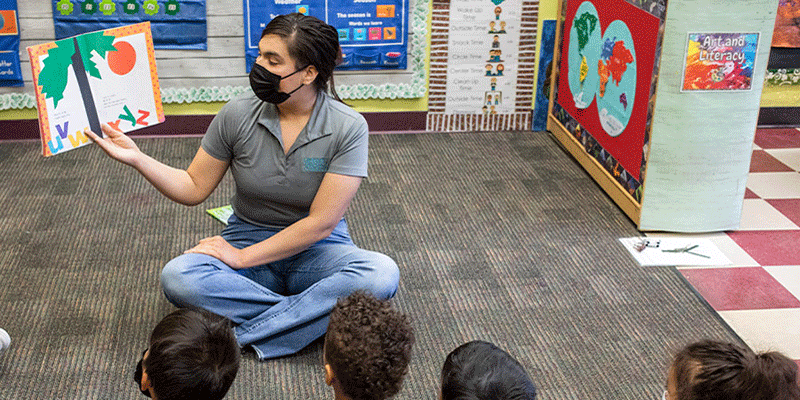College’s Early Childhood Education Center Receives National Accreditation
03/11/2024

Moreno Valley College’s Early Childhood Education Center has received national accreditation from the National Association for the Education of Young Children (NAEYC).
“The first five years of a child’s life are so important for their formative development,” Sandra Rivas, manager, said. “We believe that giving them a nurturing and supportive educational environment puts them on a road to success.”
The Early Childhood Education Center is open to children ages two to five years of age and is open to the community.
Rivas said that this “accreditation demonstrates our commitment to quality and continuous quality improvement. By pursuing and accepting accreditation, our center commits to ensuring that the environment, policies, and practices align with NAEYC’s early learning standards and recommended practices.”
In the city of Moreno Valley, the child population experiences higher levels of challenging circumstances that may negatively impact lifetime educational outcomes, such as homelessness (19.2 percent vs. 4 percent in Riverside County and 3.8 percent at the state level), financial challenges, and additionally Moreno Valley is considered a childcare desert — this is when the need for care and early education exceeds the opportunities to enroll.
“Early childhood education helps to reverse and slow the trajectory of perpetuating these data as adults,” Rivas said.
While national accreditation is not mandatory, Rivas said, “We voluntarily underwent a comprehensive internal self-study and continuous quality improvement process. Our program had to demonstrate quality by meeting the 10 NAEYC program standards. These standards are research-based best practices for young children’s development.
“Furthermore, as a reputable indicator of quality, NAEYC accreditation correlates with children's greater readiness and success in school and beyond; increased educational attainment rates; and overall healthier lifestyles."
Earning the accreditation, which is good for five years, also benefits the students studying to obtain an Early Childhood Education Degree.
Students can include on their resumes that their observation and practicum hours were
completed at a nationally accredited center. Teachers and program staff will benefit
from the focus on continuous improvement, which provides an avenue for self-reflection
and continued professional growth.
“Those working in the center will have access to continuous quality-improvement resources,
such as the latest research on best practices, training, and technical assistance,”
Rivas said. “I feel proud of our program and team because we have worked hard for
this achievement,” Rivas said. “This is something that we’ve been talking about and
working towards for years. The sense of accomplishment feels fantastic.”
Robin Steinback, Ph.D., echoed Rivas’ feelings when she said, “this accomplishment needs to celebrated by the College and the community.”
Published by External Relations & Strategic Communications

